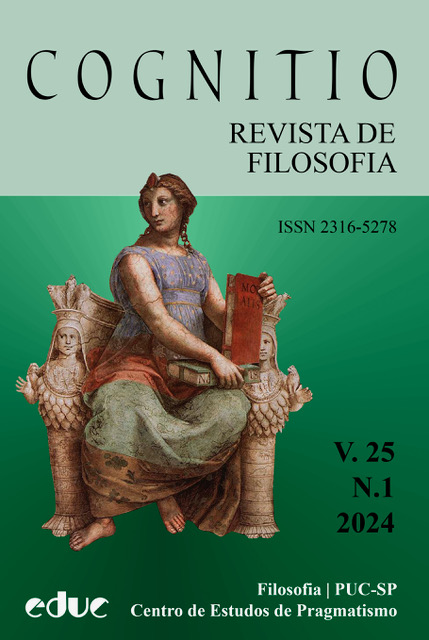Philosophy as a path to transformation
a pragmatist perspective
DOI:
https://doi.org/10.23925/2316-5278.2024v25i1:e65419Keywords:
Peirce, Self-control, Self-transformation, Spiritual exercise, StoicsAbstract
In the ancient period – Greek and Hellenistic in particular – philosophy was conceived not as a pure intellectual activity geared toward the search for truth, but as a practical exercise of thought that was meant to serve life and aim at self-transformation. The goal was to learn how to conduct a philosophical life and take care of oneself: especially of one’s speeches and actions. It was not so important to be able to expose a true doctrine, but to put into practice the teachings that were given. This perspective lapses as early as the medieval period, but one may wonder if pragmatist attitude does not reanimate some aspects of it: for example, the grafting of practice into theory, the conception of ideas as plans for action, the reference to truth effects, and the like. In this paper I intend to test this hypothesis, especially with reference to the study Peirce has conducted on the process of “self-control” (the ancients would have said “self-government”, autarkeia) as the basis of ethics, understood as a normative science and the foundation of logic.References
ATKINS, Richard. Peirce and the Conduct of Life. Cambridge, Mass.: Cambridge University Press, 2016.
BRENT, Joseph. Charles Sanders Peirce: a life. Bloomington and Indianapolis: Indiana Uni-versity Press, 1993.
COLAPIETRO, Vincent. Towards a pragmatistic account of human practices. Noema, v. 13, 2022. https://doi.org/10.54103/2239-5474/18856
EPITECTETUS. The Discourses of Epictetus, with the Encheridion and Fragments. George Long transl. London: George Bell and Sons, 1890.
FABBRICHESI, Rossella. An Apology for a Dynamic Ontology: Peirce’s Analysis of Futurity in a Nietzschean Perspective. Philosophies, v. 8, n. 35, 2023. https://doi.org/10.3390/philosophies8020035
FABBRICHESI, Rossella. Vita e potenza: Marco Aurelio, Spinoza, Nietzsche. Milano: Cortina editore, 2022.
FABBRICHESI, Rossella. The principle of hope as the ontological foundation of Peirce's philosophy. Athanor, v. 32, n. 26, 2024.
FOUCAULT, Michel. Technologies of the self: a seminar with M. Foucault. Amherst: The University of Massachusetts Press, 1988.
FOUCAULT, Michel. The government of self and others: lectures at the Collége de France 1982-1983. Davidson A. ed.; G. Burchell (transl.). Hampshire & New York: Palgrave Macmil-lan, 2010.
FOUCAULT, Michel. The hermeneutics of the subject: lectures at the Collége de France 1981-1982. Davidson A. ed.; G. Burchell (transl.). Hampshire & New York: Palgrave Macmillan, 2005.
FOUCAULT, Michel. The use of pleasure. R. Hurley (transl.). New York: Vintage Books, 1985.
HADOT, Pierre. Exercices spirituelles et philosophie antiques. Paris: Albin Michel, 2002.
HOLMES, Larry. Peirce on Self-control. Transactions of the Charles S. Peirce Society, v. 2, n. 2, p. 113-130, 1966.
IBRI, Ivo A. Semiotics and Pragmatism: Theoretical Interfaces. Cham: Springer, 2022.
LISZKA, James J. Charles Peirce on ethics, esthetics and the normative sciences. London and New York: Routledge, 2021.
LISZKA, James J. The Role of the Normative Sciences in the Evolution of Peirce’s Pragmatism. Paper presented at the American Philosophical Association Meeting, New York, New York, January 17, 2024.
MADELRIEUX, Stéphane. Philosophie des expérience radicales. Paris: Seuil, 2022.
MARCUS AURELIUS. Meditations. Martin Hammnd transl. London: Penguin Classics, 2006.
MASSECAR, Aaron. Ethical habits: a Peircean Perspective. Lanham (MD): Lexington Books, 2016.
NIETZSCHE, Friedrich. Daybreak. Cambridge: Cambridge University Press, 1997.
NIETZSCHE, Friedrich. The Gay Science. W. Kaufmann (ed.). New York: Vintage Books, 1974.
PEIRCE, Charles Sanders. The Collected Papers of Charles Sanders Peirce. 8 vols. HARTSHORNE; WEISS; BURKE (eds.). Cambridge (MA): Harvard University Press, 1931-1958. [CP].
PEIRCE, Charles Sanders. The Essential Peirce. 2 vols. The Peirce Edition Project (ed.). Bloomington and Indianapolis: Indiana University Press, 1992-1998. [EP].
PETRY, Edward S. The origin and development of Peirce’s Concept of Self-Control. Transactions of the Charles S. Peirce Society, v. 28, n. 4, p. 667-690, 1992.
POTTER, Vincent. Charles Peirce on Norms and Ideals. Fordham University Press, 1997.
POTTER, Vincent. Peirce’s Analyisis of normative sciences. Transactions of the Charles S. Peirce Society, v. 2, n. 1, p. 5-32, 1966.
RAPOSA, Michael. Self-control. American Journal of Theology & Philosophy, v. 21, n. 3, 2000.
SENECA, Lucius Annaeus. Moral Letters to Lucilius. Complete Classics, 2016.
SINI, Carlo. La vita dei filosofi. Milano: Jaca Book, 2019.
Downloads
Published
How to Cite
Issue
Section
License
Copyright (c) 2024 http://creativecommons.org/licenses/by/4.0/

This work is licensed under a Creative Commons Attribution 4.0 International License.









